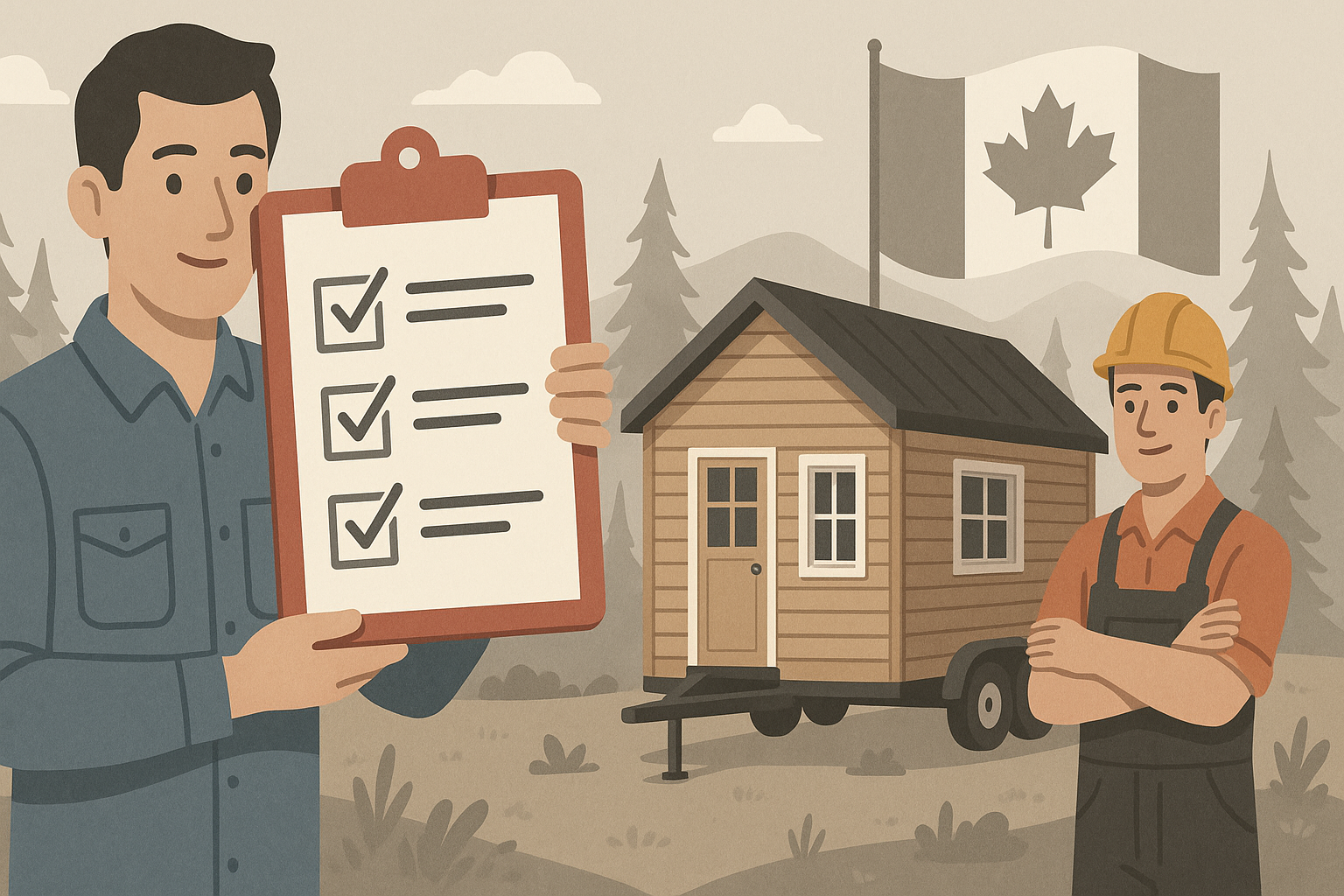
How to Find a Contractor for a Tiny Home in Canada: Your Complete Guide
Estimated reading time: 10 minutes
Key Takeaways
- Plan Ahead: Research thoroughly and use reputable Canadian directories to find experienced tiny home builders.
- Specialized Expertise: Specialized contractors offer tailored solutions for off-grid systems, winter-proofing, and efficient use of small spaces.
- Clear Contracts: Insist on detailed, written contracts outlining scope, timelines, warranties, and payment milestones.
- Vetting Is Vital: Verify credentials, references, and local certifications to avoid costly mistakes.
Table of Contents
- Introduction: Find a Contractor for a Tiny Home
- Understanding Tiny Home Construction: Tiny Home Builder Canada
- Why Hiring a Tiny Home Builder Matters: Best Tiny Home Contractor
- How to Find a Contractor for a Tiny Home: Tiny Home Builder Canada
- Determining the Best Tiny Home Contractor for You: Best Tiny Home Contractor
- Tiny House Construction Tips When Working With a Contractor: Tiny House Construction Tips
- Additional Advice for Hiring a Tiny Home Builder: Hiring a Tiny Home Builder
- Conclusion: Find a Contractor for a Tiny Home
- Frequently Asked Questions
Introduction: Find a Contractor for a Tiny Home
To successfully find a contractor for a tiny home, it’s essential to choose wisely from the very beginning. The contractor you select will make the difference between a safe, high-quality, and properly permitted tiny home—and one that faces expensive repairs or legal trouble down the line. Trusting only the best tiny home contractor will safeguard your investment, ensure compliance with complex building codes, and help realize your unique vision.
Navigating this process can be challenging. Many people fall into common pitfalls such as:
- Contractors with unclear or fake credentials
- Poor or inconsistent build quality
- Builders with little or no experience in tiny homes
- Unawareness of current zoning laws or building regulations
These issues are widespread, as highlighted by The Tiny Life – Canada Tiny House Builders Guide. Taking shortcuts when hiring a tiny home builder can lead to unfinished homes, unsafe structures, or legal headaches if building codes are ignored or misunderstood. By learning from others’ mistakes and applying proven strategies, you can ensure your new tiny home starts off on the right foundation—both literally and figuratively.
Understanding Tiny Home Construction: Tiny Home Builder Canada
Tiny home construction isn’t simply downsizing a regular house. In Canada, tiny homes usually measure between 100 and 400 square feet and may be:
- Built on a trailer (tiny homes on wheels)
- Set on a permanent foundation
Both approaches come with their own design and construction complexities. Builders need to excel at:
- Space-maximizing layouts: Every centimetre matters. Clever storage and multi-purpose furniture are a must.
- Integrated systems: Special plumbing, electrical, and heating systems are required to suit compact sizes.
- Four-season insulation: With harsh Canadian winters, insulating to R-values that exceed building code minimums is vital. Not all homebuilders are familiar with spray foam or closed-cell options tailored for mobile homes or tiny spaces.
- Off-grid potential: Many tiny home lovers seek solar, rainwater harvesting, composting toilets, and more. Knowledge of battery storage, low-voltage wiring, and alternative heat sources is key.
Unlike traditional houses, tiny homes present creative challenges around integrating all the necessities—kitchen, bathroom, sleeping, storage—into just a few square metres. Builders such as Minimaliste Houses dedicate their skill to these requirements, mixing design innovation with rigorous construction standards.
If you want your tiny home to handle Canadian snow loads, humidity, or to work off-grid, hiring a builder with proven expertise is essential. Standard construction trades might miss the mark on these highly specialized needs. For additional insights on building for harsh Canadian climates, check our guide on How to Build a Winter-Proof Tiny Home Designed for the Harsh Canadian Climate.
Why Hiring a Tiny Home Builder Matters: Best Tiny Home Contractor
You might wonder whether hiring a specialized tiny home contractor is truly necessary—or if any experienced general contractor will suffice. The answer is clear: a best tiny home contractor brings huge advantages that will directly improve your home’s safety, usability, and lifespan.
Key Benefits:
- Mastery of tiny space design: Tiny home builders excel at using every nook and cranny for efficient living, sleeping, and storage—something general contractors may overlook.
- Proven methods for climate resilience: Canadian codes are strict for good reason. Knowledgeable contractors choose the right insulation, vapour barriers, and building envelopes for our four-season climate.
- Compliance with zoning, mobility, and code: Specialist contractors know local bylaws, CSA certifications for tiny homes on wheels, road-legal dimensions, and weight management.
- Tailored custom features: From Murphy beds to integrated solar solutions, only specialist builders have seen and delivered these innovations.
Dangers of Hiring the Wrong Contractor:
- Code violations: Leading to forced removals, fines, or safety issues.
- Missed opportunities: Inefficient layouts and inferior materials can diminish your investment.
- Water, mould, or condensation problems: Resulting from inappropriate wall assemblies or substandard insulation.
- Wasted budget: Excessive costs fixing mistakes that a certified builder would have avoided.
For further reading, explore resources like The Tiny Life – Canada Tiny House Builders Guide and Minimaliste Houses. You may also find insights on Tiny Home Design in Canada: Expert Tips for Maximizing Small Living Spaces valuable.
How to Find a Contractor for a Tiny Home: Tiny Home Builder Canada
Finding the right tiny home builder in Canada is a process that rewards careful research and a methodical approach. Here’s a clear step-by-step guide:
Step 1: Research Reputable Builders
-
Browse comprehensive Canadian directories such as
Tiny Homes in Canada Directory,
Tiny Living – Canadian Tiny Home Builders, and
Craft-Mart Tiny Home Builder Directory. - Check builder websites for full photo galleries, videos of past projects,/design options, and customer testimonials.
- Noteworthy Canadian tiny house makers include: Minimaliste, known for insulated, all-season builds, and Teacup Tiny Homes for innovation and personalized designs.
Step 2: Leverage Local Networks
- Join online forums and Canadian Facebook groups focused on tiny home living.
- Attend home shows, tiny house expos, and regional events to see workmanship up close.
- Seek personal recommendations from those who have built tiny homes in your province.
Step 3: Contact and Interview Potential Builders
- Ask questions such as: “How many tiny homes have you built?”, “Can you customize for off-grid or winter use?”, and “Will you handle all permitting and compliance?”
- Determine if the builder is comfortable with local codes, requirements, and tiny-specific engineering details.
- Request details on warranty coverage for both materials and workmanship.
Step 4: Check References and Credentials
- Speak with multiple past clients and, if possible, tour completed projects.
- Verify that the builder holds provincial trade licenses, general liability insurance, and any necessary third-party certifications.
For more detailed insights, consult How to Choose a Reliable Tiny Home Builder Canada: Expert Hiring Advice and Construction Tips for Your Project.
Determining the Best Tiny Home Contractor for You: Best Tiny Home Contractor
Selecting the best tiny home contractor involves more than comparing prices. Use these detailed criteria to make a confident, informed choice:
Evaluate Experience and Specialization
- Confirm if the builder has significant experience with your desired style, such as off-grid setups, urban designs, or family layouts.
- Verify a proven track record with local authorities and successful permits.
Compare Project Portfolios and Satisfaction
- Review similar completed builds to assess layout efficiency, materials used, and overall quality.
- Look for consistent homeowner satisfaction and creative problem-solving in their projects.
Scrutinize Contracts and Warranties
- Ensure every aspect—scope of work, timelines, materials, and warranty details—is clearly defined in writing.
- Ask about the process for handling mid-build changes or disputes.
Compare Quotes Responsibly
- Collect at least three detailed quotes and avoid automatically choosing the lowest bid.
- Assess whether a low price might reflect inexperience, poor materials, or omitted services.
Trust your instincts and thorough research when making your decision.
Tiny House Construction Tips When Working With a Contractor: Tiny House Construction Tips
A successful partnership with your tiny home builder relies on clear communication, careful planning, and meticulous documentation. Here are top tips to smooth the journey:
Define Your Vision
- List your must-have features, such as the number of sleeping areas, kitchen type, or off-grid capacity.
- Set your total budget, including a 10-15% contingency for unexpected costs.
Maintain Strong Communication
- Establish a regular update schedule (weekly updates are ideal) and insist on milestone walkthroughs at key project stages.
- Address concerns immediately to keep the project on track.
Document Everything
- Record all agreed changes, additional costs, and adjustments in writing.
- Keep copies of invoices, signed contract addendums, and other major communications.
Plan for Contingencies
- Allow for financial and time buffers to handle weather delays or design tweaks.
- Avoid pressuring the builder to rush—quality and compliance must come first.
For additional construction and design tips, visit Tiny Home Living: Your Complete Guide to Micro Homes, Sustainability, and Lifestyle Freedom.
Additional Advice for Hiring a Tiny Home Builder: Hiring a Tiny Home Builder
During the hiring process, stay alert for warning signs and use best practices to protect your investment.
Red Flags to Watch For
- Communication gaps: Unanswered emails, vague promises, or delayed responses.
- Vague contracts: Every detail of the project scope, schedule, and budget should be in writing.
- Lack of references: A quality builder will provide multiple past client contacts and project photos.
- No proof of licensing or insurance: Always verify trade licenses, insurance policies, and specialized certifications.
Foster a Collaborative Relationship
- Encourage open discussions on design tweaks, finishing materials, and energy systems.
- Respect your builder’s expertise with regulations and construction methods.
Secure Payments and Milestones
- Structure payments around key deliverables and never pay a lump sum upfront.
- Retain a final payment until every aspect of the work is signed off as complete.
Conclusion: Find a Contractor for a Tiny Home
Selecting the right contractor is the single most critical decision when building your tiny home in Canada. By choosing someone with proven experience and a stellar reputation, you ensure safety, comfort, and a custom solution that meets strict codes and your unique wishes.
To recap:
- Research Thoroughly: Use reputable builders directories and review customer feedback.
- Interview and Verify: Ask detailed questions and check credentials and references.
- Insist on Clear Contracts: Confirm the scope, schedule, materials, and warranties in writing.
- Follow Best Practices: Maintain strong communication, document changes, and plan for contingencies.
- Watch for Red Flags: Never skip verifying licenses, insurance, or staged payments.
Apply these proven strategies to ensure your tiny home journey is smooth, safe, and successful.
Further reading and resources:
The Tiny Life: Canada Tiny House Builders Guide
Tiny Homes in Canada Directory
Minimaliste Houses
How to Choose a Reliable Tiny Home Builder Canada
Tiny Home Design in Canada: Expert Tips
Frequently Asked Questions
Q1: How do I verify a tiny home builder’s credentials?
A: Check for provincial trade licenses, read past client testimonials, and if possible, visit completed projects. Reputable directories and online forums can also provide verification.
Q2: What should be included in the contract?
A: The contract should detail the full scope of work, specific timelines, material specifications, warranty information, and payment milestones.
Q3: Can a general contractor build a tiny home?
A: While a general contractor may have the necessary construction skills, a builder specialized in tiny homes will better address unique design challenges, off-grid needs, and the intricacies of local codes.

Leave a Reply